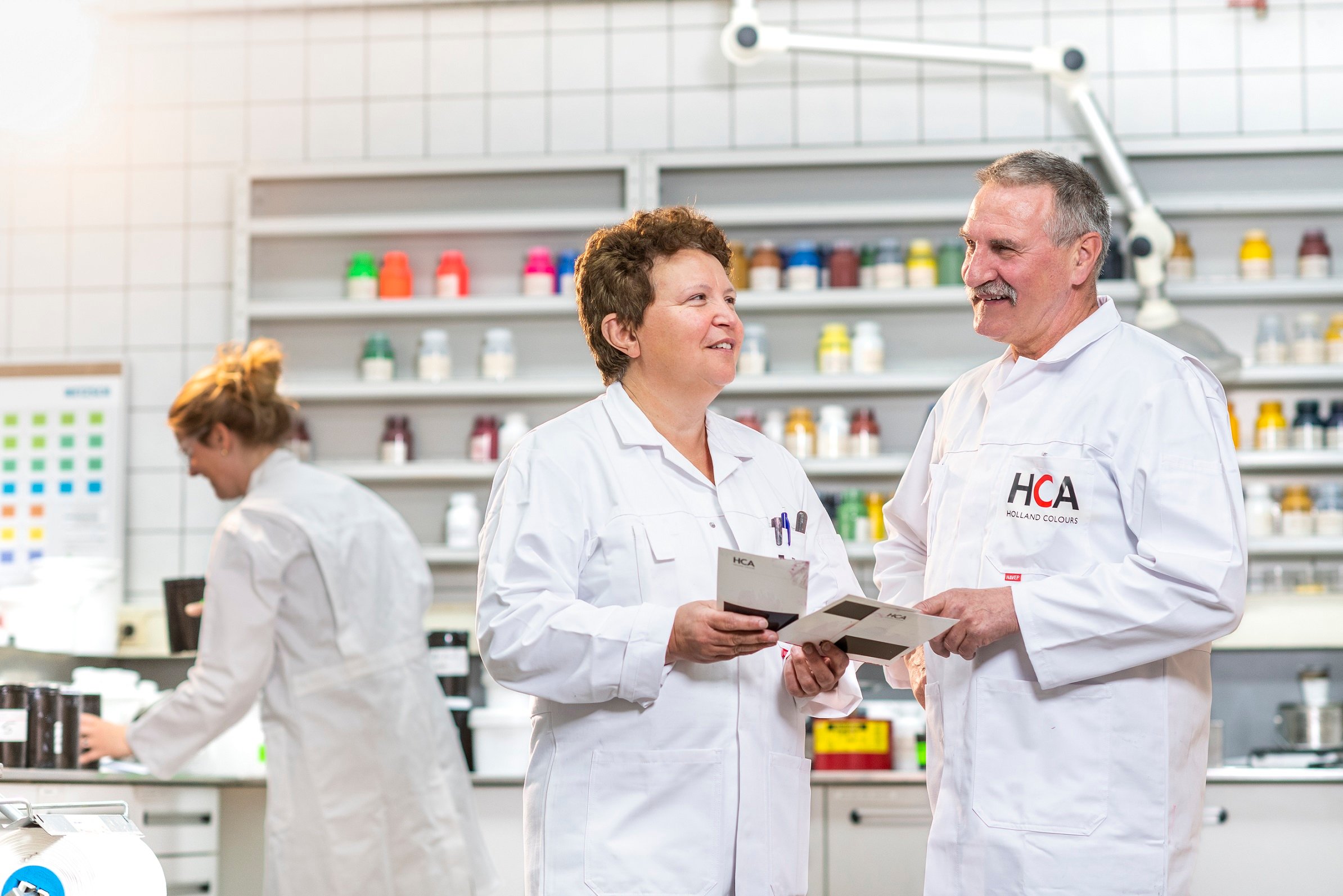
Environmental, Social and Governance (ESG)
In 2021, we integrated ESG criteria into our strategy. While we had already aligned with many ESG aspects, we've since formalized our approach, embedding ESG into our decision-making, internal frameworks, and external communications.
ESG is central to our organization
The concept of ESG – Environmental, Social and Governance monitoring and reporting – has gained in importance among European companies over the past few years, aligning with the changing regulatory landscape of the EU. Holland Colours, too, has aligned itself with this change. ESG represents an evolution from Corporate Social Responsibility (CSR) commitments, something that Holland Colours has always been strongly committed to.
As a result, while the ESG terminology is new, some of the principles it covers are already built into Holland Colours’ ESG strategy. For the full ESG reporting, please have a look at our ESG report.

ESG ROADMAP 2021-2025
In 2024/2025, we took a further step regarding our double materiality analysis and validating the outcomes. We are now close to finalizing these. We also made progress towards completing our gap analysis regarding what data we already have and what data collection systems we still need to set up. We also made progress on designing processes and controls, and started implementing them to manage ESG. This further emphasizes our
commitment to integrating sustainability across the company. Integrating CSRD and its ESRS requirements (European Sustainability Reporting Standards) into the company is a step-by-step process. Below is the roadmap we are following.
Transition
- Started preparing for introduction of CSRD reporting directive
- New baseline for implementation of Scope 1, 2 and 3
- Integrated ESG reporting as part of overall strategy and reporting in Annual Report
- Completed definition measurements for sustainable products and analyzing first part of product portfolio
Integration
- ESG governance structure in place
- Initiated the renewal of the double
materiality analysis (DMA) to
include both inside-out/outside-in
perspectives - Analysis of products for
sustainability: >95% of the product
portfolio analyzed
Future-Proof
- Draft double materiality analysis in place
- Draft gap analysis completed
- Processes designed, controls designed
and working on implementation - IT landscape/architecture regarding
non-financial information identified - The reporting dashboard designed and set up
- Progress made on the non-financial reporting manual and preparing for rollout
Progress
- Data collection strategy integrated
- Sustainability topics are fully embedded as part of regular business operations and reviews
Moving Forward
- Limited assurance on ESG reporting in accordance with CSRD* and EU Taxonomy
declarations
(*) The 2025-2026 roadmap is highly dependent on the outcome of the EU Omnibus proposal to simplify ESG reporting.
Sustainability
Holland Colours’ mission is to contribute to the development of a sustainable industry. This involves collaborating as co-design partners to develop solutions that align with our clients’ ESG objectives.
On the technology side, our pigment encapsulation technology incorporates sustainability into its formulation by using renewable resources where possible. This puts us in a strong position to meet our clients’ increasing sustainability demands. Meeting sustainability and circular-economy requirements will be essential for Holland Colours’ continued success.
Our sustainability programs focus on three main areas: our process, our products and our people. Our ESG efforts in these areas derive from a selection of the United Nations Sustainability Development Goals (SDGs). Of the 17 SDGs, we selected seven that are most relevant to Holland Colours internally, to our clients, to brand owners and to our value chain partners.
They can be grouped into 3 broad categories.
Our People
We protect the safety, health and welfare of HCA employees and offer development opportunities to all. Given our geographical spread, we consider it important to employ nationally.
We invest at least 2% per year of our personnel wages in responsible care for our
employees. This investment is used to deliver training, for individual and team development and/or astime that can be spent on local social aid activities.
Our Processes
We service our customers with products that are produced regionally, and we design our processes to support the sustainable use of energy and raw materials.
By 2030, we will have reduced the CO2 impact of our operational activities by 50% versus 2015.
Our Products
Together with our customers and partners,
we co-create sustainable solutions and develop products that enable recycling, the reduction of food waste and the reduction of energy consumption.
We will structurally increase our annual investment in innovation. By 2030, 90% of our revenue will be based on products that contribute to sustainability.
Our People
Faced with an increasingly complex world, we are building a more unified, resilient and flexible organization. The aim is to improve our commercial strength, efficiency and synergy as a company.
Our ambition is to reinvest at least 2% per year of our personnel wages in our employees. This is used to stimulate their development, deliver training, to support individual and team development and/or as time that can be spent on local charity and volunteering activities
All employees are part of the Better Together Dialogue (BTD) cycle. By better understanding the ambitions and talents of our people, and discussing how each of us can contribute to our strategy of Accelerate to Win, we create a culture of continuous learning, development and feedback.
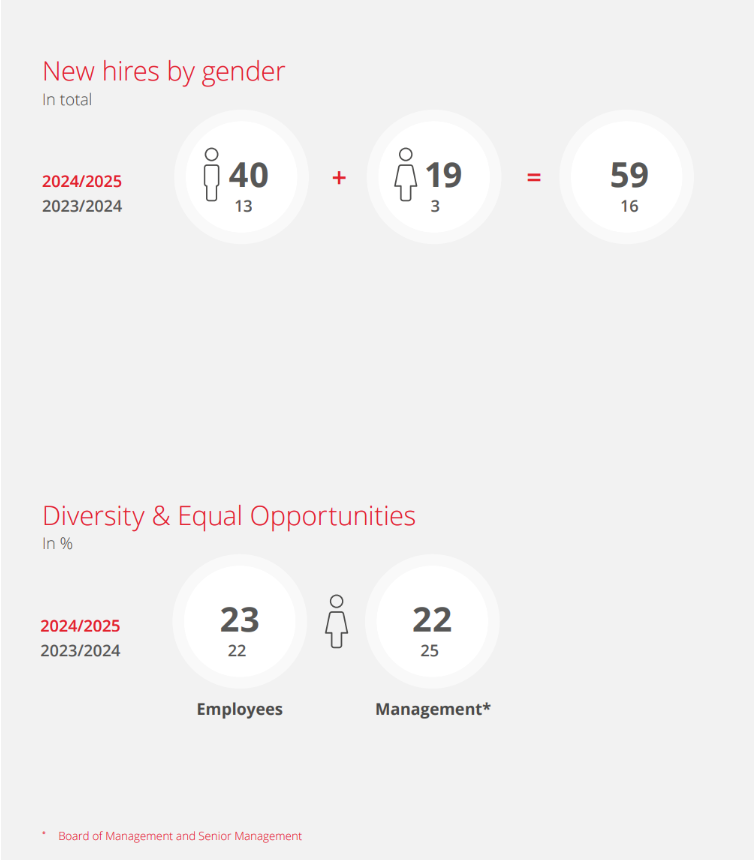
“We don't just sell a product. We have very dedicated, well-trained colleagues who really take care of our customers and ensure they're ready for tomorrow."
Health and Safety
Ensuring the safety and well-being of our employees remains Holland Colours’ utmost commitment. Our primary focus is on fostering a work environment free of accidents.
We emphasize continuous training and the empowerment of our staff to promptly report incidents, accidents and near misses.
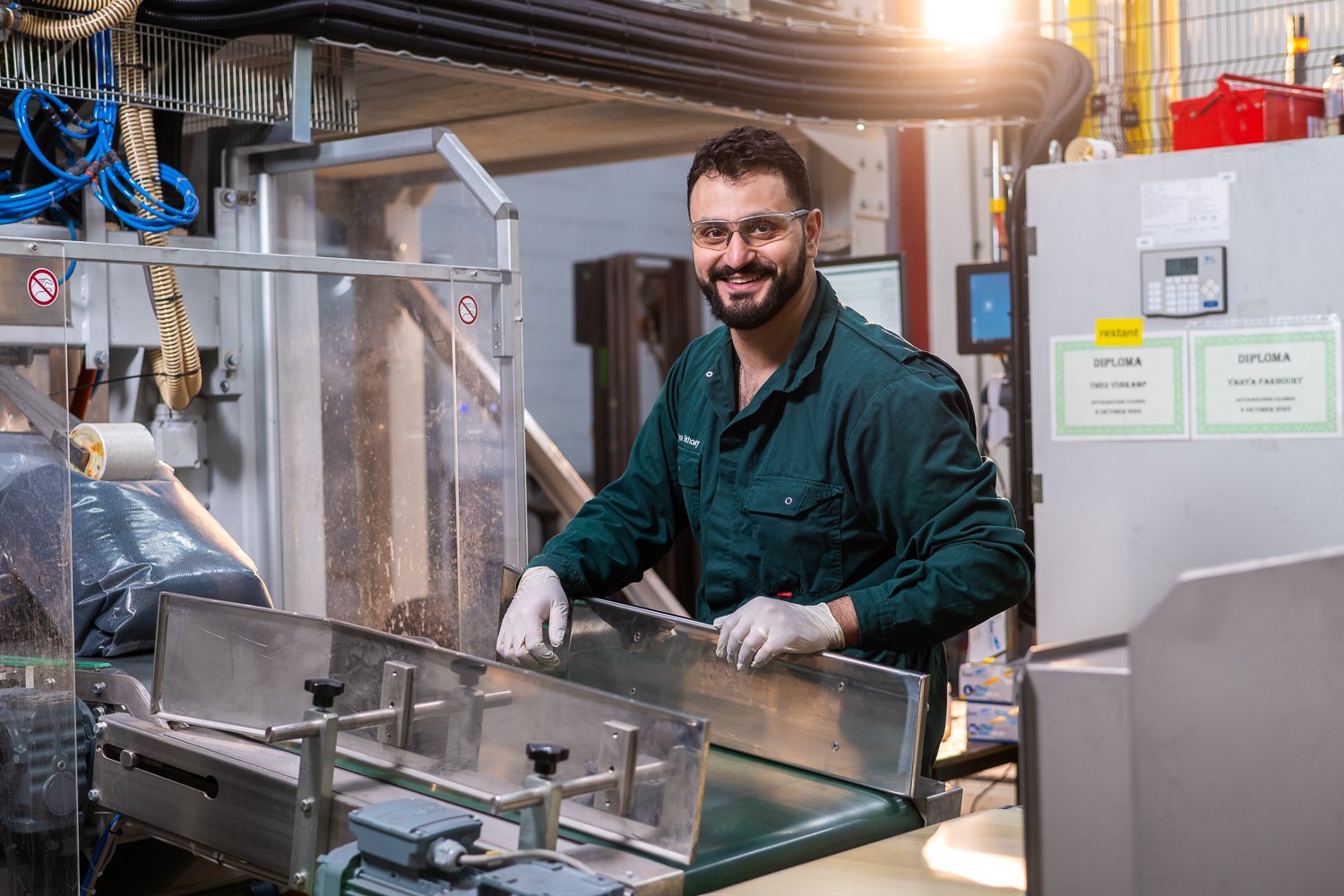
Our processes
Regarding the sustainability of our processes, our main focus has been on our GHG emissions. We are dedicated to minimizing our carbon footprint and effectively managing greenhouse gas emissions across all three scopes.
In 2024/2025, we continued our carbon footprint analysis based on the Greenhouse Gas Protocol guidelines. An external audit was carried out to determine the most suitable emission factors. In Scope 3, waste is one of the two most significant factors contributing to our overall carbon footprint. Accordingly, we will continue to focus on reducing our waste and discussing possible improvements with our suppliers to lower our emissions. Employee commuting by car is also a focus and we are working with employees to promote sustainable travel to address this issue as well.
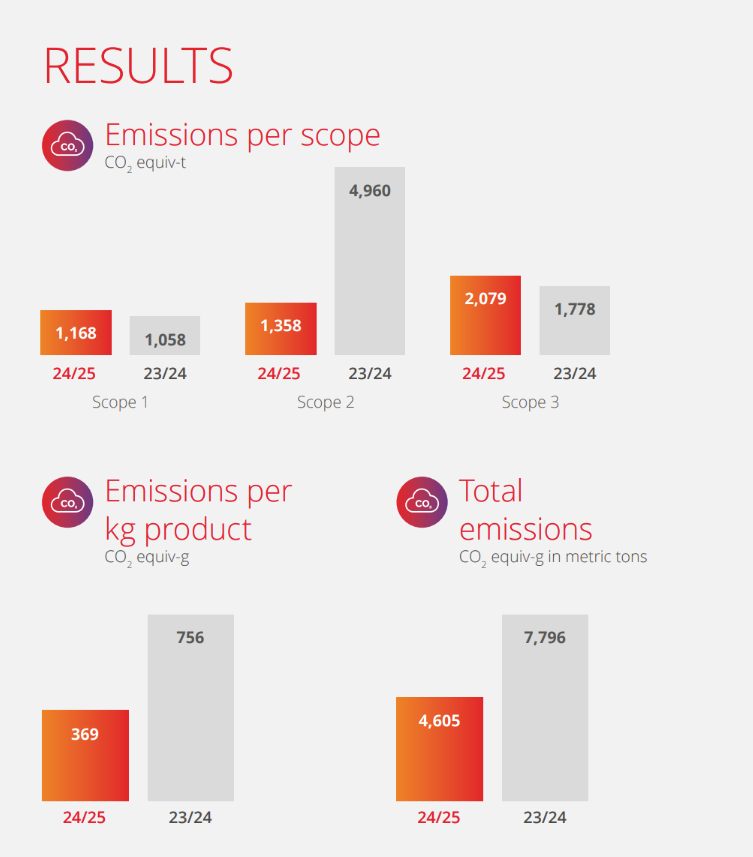
Our products
In 2024/2025, we continued to advance our sustainable product assessment methodology and applied it to 99% of our product portfolio. This was based on an enhanced understanding of our position in the transition towards more sustainable materials and by gaining deeper insights into our clients’ sustainability needs. We actively engaged with our suppliers to understand their product development processes and emphasized the importance of considering sustainability impacts.
At Holland Colours, we have defined a sustainable product as follows:
- it enables our customer to have a lower cradle-to-gate CO2/kg equivalent impact in material usage versus the main alternative solution in a specific application subsegment; or
- it enables our customer to have a lower CO2/kg equivalent impact in their production versus the main alternative solution; or
- it supports the increased recycling of materials.
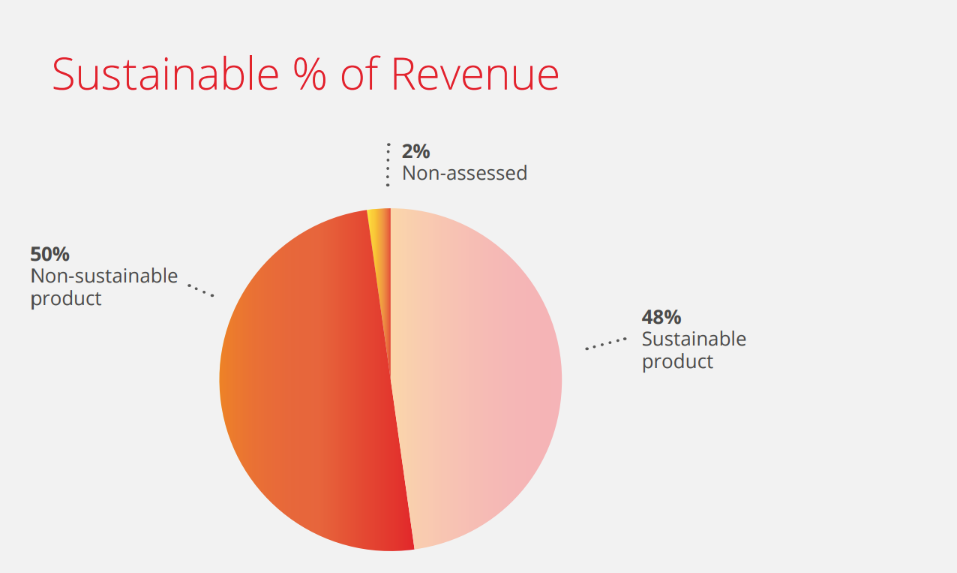
At the end of 2024/2025, 48% of our assessed product portfolio is considered sustainable, an increase of 4% versus last year. This 4% improvement is attributable to normal shifts in the product portfolio and additional assessments (29 new product-market combinations evaluated this year). Only 2% of our portfolio remains unassessed, compared to 5.0% last year.
The decrease is due to the inclusion of more categories that grew in volume are now eligible for assessment. Additionally, some straightforward product categories were newly evaluated. These results are primarily due to criteria 1: the product used and, specifically, the use of natural or biobased carrier materials that, on average, lowered the environmental impact. The largest contribution in our cradle-to-gate analyses came from the Scope 3 raw material impact.
How we give back
Our people
Our investment in our community represents who we are as a company and as individuals.
